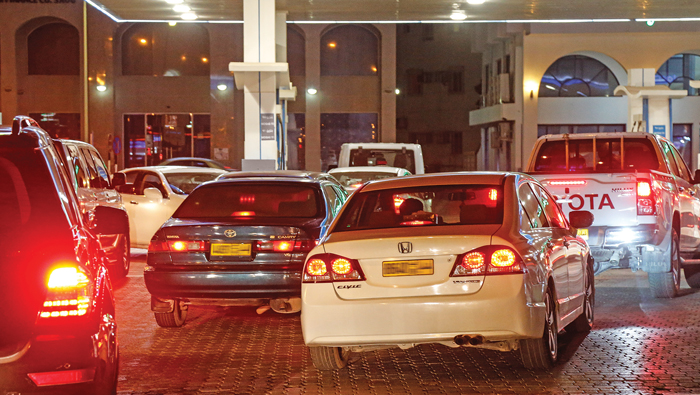
Muscat: From today (Monday), residents in Oman will have to spend more to fuel up their vehicles, unless they can benefit from a government safety net scheme. Oman’s Ministry of Oil and Gas has announced fuel prices for the month of January — which came into effect at midnight — and dropped a government cap on M91 after the introduction of a subsidy programme for Omanis.
M91 is priced at 199 baisas per litre, 13 baisas above its previously capped limit of 186.
The price of M91 will now depend on global oil prices, but Omani families on low incomes have been protected by a government scheme. The government has ensured needy citizens are provided a safety net with the government’s National Subsidy System (NSS).
Subsidised rate
Families that earn less than OMR600 a month will be able to buy the first 200 litres of fuel every month at a subsidised rate of just 180 baisas under the scheme. The scheme, however, is only for Omanis.
The NSS was announced last year to support low-income Omanis, and more than 156,000 nationals registered for it by the end of December 2017. From January 2018, M91 will cost 199 baisas per litre, M95 will be priced six baisas higher than its current 213 baisas per litre, and the price of diesel will be 230 baisas per litre, up from 219 baisas.
The government has set aside OMR100 million for funding the NSS in its 2018 budget. Stakeholders in the programme include the government's Oman Fuel Pricing Committee and fuel retailers Oman Oil Marketing Company, Al Maha and Shell Oman Marketing Company.
Fuel subsidies were removed in Oman in 2016 as a measure to ease the expenditure of the government. The prices were allowed to fluctuate with the global oil prices, and with Oman crude reaching a three-year high last week, fuel prices are expected to remain at higher levels.
“It is a matter of fairness and for people with low income to get the necessary items. This is important. I believe OMR100 million is substantial to cover the fuel needs of all the low-income people in Oman,” said Fabio Scacciavillani, chief economist at the Oman Investment Fund, supporting the government initiative.
Ahmed Al Balushi, an Omani national, commended the move by the government, and stressed that it was very important for a lot of nationals who earn less or are looking for work and stay in the interiors. “This is very important for us. A lot of people were struggling with this, but this is great news and 180 baisas is not bad either.”
Expatriates, however, will not benefit from this. “If we have a travelling job, this is a big problem. I hope there is something planned for us too, or at least the companies can support people who earn less,” remarked Pradosh Chandra, an Indian expatriate.
Rising diesel prices have also increased the operating costs of logistics companies.
“The rise in the cost of diesel will have to trickle down to our consumers if we want to be profitable,” noted a manager at a logistics company.
Mohammed, a taxi driver in Ruwi, said that inflation was affecting his trade.
“Fuel prices are up but we are not supposed to increase the fares. Prices of goods are going up.”
A managing director of a transport company, whose firm owns and operates a large number of school buses, said that the hike in fuel price has affected them. “I am operating buses for schools, and I cannot increase the fee. Contracts are made on an annual basis,” he explained.